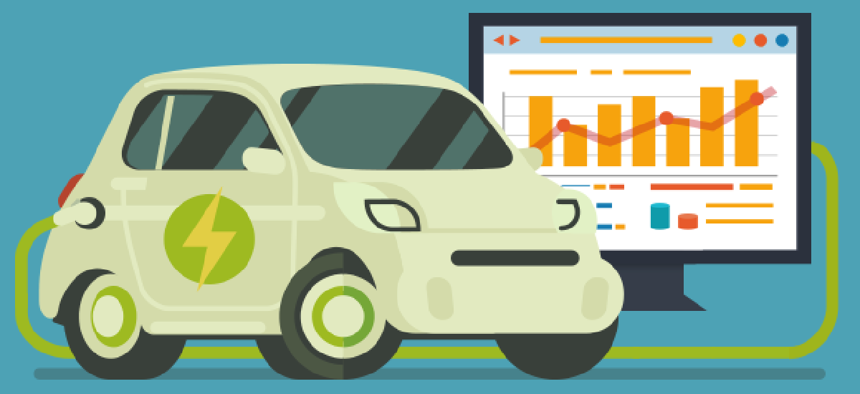Charging ahead: Data drives EV adoption for state and local fleets


Connecting state and local government leaders
With data captured by telematics solutions from electric vehicles, fleet managers can compare the performance of EVs with their gas-powered counterparts to validate projected savings and ramp up future electrification efforts.
President Joe Biden has been vocal about his goals to boost federal investment in electric vehicles and EV infrastructure since the start of his administration. His proposed American Jobs Plan includes $174 billion for promoting the domestic production of EVs and notably electrifying the entire federal fleet. The plan also includes grants and incentive programs designed to encourage the building of more charging stations to ease “range anxiety,” or concerns about how far EVs can travel before needing to stop and recharge.
To solve for range anxiety, the administration plans to grow the number of charging stations in the United States from 42,000 to 500,000 by 2030. Yet even then, perceived upfront costs may deter some state and local governments from purchasing EVs -- even those who see EV adoption as an ideal solution to reducing the environmental impact of public fleets.
State and local government leaders interested in electrifying their fleets but put off by the upfront costs of purchasing EVs should take into account the total cost of ownership of these vehicles throughout their lifetime. Running a TCO calculation may reveal that an electric fleet can actually present greater long-term savings, thereby easing the path to adoption.
Calculating the total cost of ownership
TCO is calculated by adding the total cost of buying and owning a vehicle, including the purchase price, sales tax, financing and warranty expenses, insurance costs and the costs for operations and maintenance. Any rebates or incentives are subtracted from that total, including money that can be recouped when the vehicle is sold.
Looking at the TCO equation alone, it may seem like the costs outweigh the returns. But there are aspects to operating EVs that are far more cost-effective than their internal combustion engine counterparts. For example, EVs require less maintenance because there is no need for oil changes or transmission repairs. And whereas an ICE car has more than 2,000 different moving parts -- many of which will need service or replacement at some point -- an EV only has 20 moving parts. In fact, a AAA study finds that annual maintenance costs for an EV are $330 less than that of an ICE car, and the Department of Energy finds that the average cost of driving an EV is about half the expense of an ICE vehicle.
Certainly, TCO calculations provide essential projections that can facilitate the first steps to adoption. But once purchased and deployed, how can state and local leaders, as well as government fleet managers, know if their electric fleets are truly providing savings over time? This is where vehicle telematics can be hugely beneficial.
Telematics to supercharge fleet management
Telematics solutions can capture and share detailed, real-time information about how each EV performs, in addition to its location and battery and charging status. These metrics provide valuable intelligence for fleet managers, helping to more accurately measure TCO, improve daily fleet management and even proactively detect issues to enable preventative maintenance. Notably, some of the metrics that managers would be monitoring for can be unique to an electric fleet, including:
- Historical driving distance data: Telematics solutions can track the exact mileage that a vehicle covered on a particular route or day. This data is also tracked in a traditional ICE fleet, but it’s purpose on an electric fleet is different. This intelligence could be used to guide decisions about the suitability of EVs for specific service areas or routes.
- EV charging station maps: EV charging station maps on a telematics app can show drivers and managers where nearby charging stations are, as well as details about those stations, such as the level of charging (voltage and speed). These maps can help inform route planning and decisions about when a driver should stop and charge. If plans to grow the nationwide charging infrastructure are successful, these decisions and the ability to locate stations will become easier in time.
- Vehicle charge status: Real-time state-of-charge reporting provides visibility into the battery status of each EV so managers can make smarter decisions about where and when to deploy a vehicle. Telematics reports can even support analysis of a vehicle’s energy performance when particular drivers are behind the wheel, showing the impact of behaviors like speeding and harsh braking on mileage.
- Recharging: If recharging stations back at the lot or depot are limited, real-time, state-of-charge reports can help managers prioritize the order in which vehicles must be charged. They can decide whether to delay charging to take advantage of off-peak electric rates and which vehicles should be plugged into faster charging stations.
The data captured by telematics solutions from EVs can also assist in the transition process from a fleet of all ICE vehicles. Managers can access historical utilization data and compare the performance of their EVs with their ICE counterparts to validate projected savings and, based on the findings, ramp up future electrification efforts.
Ultimately, data and telematics insights on electric fleets will be the key to driving EV adoption among state and local governments. The more connected intelligence that decision-makers, fleet managers and operators have about their owning and operating costs, the location of their vehicles, how much battery life they have, and where the closest charging station is, the more confident they’ll be making that first purchase and expanding adoption thereafter.




